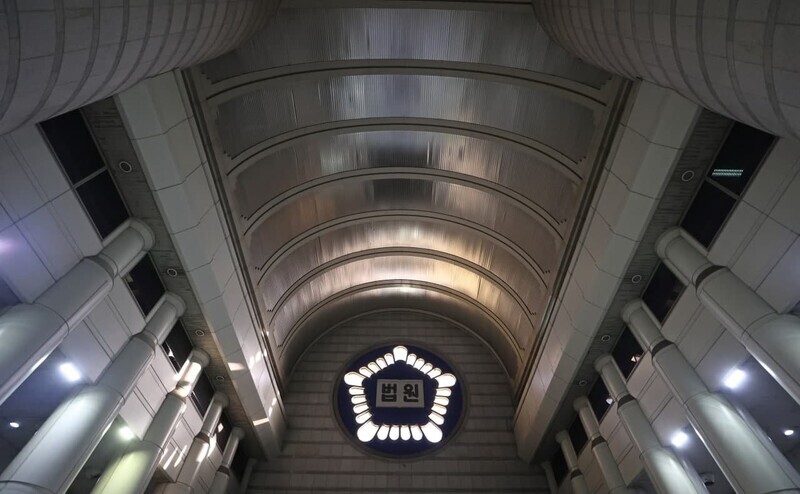hankyoreh
Links to other country sites 다른 나라 사이트 링크
[Court observer] The case of the defector's son and the stolen chestnut candies

Editor’s note: There are no windows in South Korea’s courtrooms. A courtroom brightly lit by sunshine is the kind of thing only found in movies or TV shows. Isolated from the outside world, these are places where countless people experience joy and devastation every day. A single ruling merely a few lines in length may leave one person’s once-untroubled life completely upended, or it may provide a turning point for someone in desperate circumstances.The trials of ordinary people — proceedings that go unnoticed by the public — offer a way of better understanding our neighbors. That’s why the Hankyoreh is endeavoring to open a small window into the courtrooms where everyday people face trials.
The young man stood in the courtroom, dressed in green prison garb. He was of average build, neither thick nor scrawny, and his boyish face made him seem younger than he was.
Referred for trial on charges of theft, he had remained in detention during the investigation and trial. His head was hung low.
Nobody was there to see him. On that mid-October day, the courtroom in Seoul echoed with the voice of the prosecutor reading off the charges.
It started with the theft of a chestnut candy costing 2,000 won, or US$1.70. On April 1, 22-year-old Kim Jong-seong (legal name withheld for privacy) took the candy from a self-service convenience store in Seoul’s Yeongdeungpo District.
He did it because he was hungry. The candy was something he could savor for a while. Once he unwrapped it, he could feel the flavor spread over his tongue and through his nose — a pure sweetness with no hint of sourness.

As his money ran out, he headed to other self-service convenience stores. He began shoplifting items like fried chicken that could serve as full meals.
He was finally caught in August. Since April, he had stolen food on 10 different occasions from multiple convenience stores. The value amounted to 150,000 won — the equivalent of 15,000 won every two weeks.
He was placed under arrest. Normally, these cases are resolved by a settlement and repayment for the stolen items between the parties. Even when formal criminal procedures are initiated, it typically ends with a suspension of indictment.
But Kim’s case was different. His detention was based on the fact that he had no fixed address, which made him a flight risk.
Kim could deal with being detained — the problem was the money. One of the victimized convenience store proprietors was demanding 2 million won (US$1,600) for psychological damages on top of the 38,000 won (US$32) worth of food items that Kim had stolen.
If the court issues a conviction on theft charges, it may order compensation at its discretion or the request of the victim.
Kim’s attorney admitted all of the charges but asked the court to dismiss the compensation order. Kim was arranging to provide compensation for the stolen items, they explained, but the amount of damages that were being requested was more than that he could realistically come up with.
Kim was born to a North Korean defector mother and a Chinese father. After her defection, Kim’s mother went to China, where she married her husband.
Kim’s father passed away when Kim was 5 or 6, leaving behind a large sum of debt. Kim’s mother traveled to South Korea in order to pay it back.
The father’s relatives discouraged the mother from taking her son to South Korea, arguing that she would have difficulty repaying the debts if he went along. For nine years, Kim had to live apart from his mother.
After continued efforts, Kim’s mother finally invited her son to come to South Korea a few years ago. He acquired South Korean citizenship. But the joy of the family’s reunion was short-lived.
Having spent his younger years without his mother, Kim had developed a deep-seated sense of resentment toward her, believing she had abandoned him to live in South Korea on her own. The two of them fought routinely, exchanging hurtful words until Kim finally packed his bags this spring.
Since moving out, he had essentially been homeless. Sometimes he was able to find a place to stay with money he earned as a day laborer at restaurants and other places, but once that money ran dry, he was back on the street. His poor command of Korean also prevented him from finding stable work.
Chinese friends who were aware of his plight would sometimes send him money over WeChat and other messaging services, but he could not depend on them for everything. When his funds ran out and he was left without food for long periods of time, he would go into unstaffed convenience stores and steal chestnut candies to stave off his hunger.
Kim’s attorney asked the court for leniency. Kim was “deeply remorseful for his crimes,” they explained, entreating the court to consider the circumstances.
These were crimes committed out of desperation to acquire a minimum of food when Kim was unable to hold down work due to his difficulties speaking and writing in Korean, the attorney explained.
“My client wishes to sincerely apologize right now to the victims, and he also hopes to repair his relationship with his mother,” they continued, asking the court to provide “the most lenient treatment that the law permits.” The prosecution requested a one-year prison sentence.
Throughout the hearing, Kim had sat in the dock with his head hung low. During the closing arguments, he said, “I am here today because I broke the law for the first time, but I think it may be the last. I will do whatever it takes to compensate the victims for their laws.” He kept his head down as he spoke.
Last week, the court sentenced him to a fine of 9 million won — around US$7,600.
“In light of the circumstances and number of crimes, the charges are severe, but he has admitted and expressed remorse for all of his actions, and at 150,000 won, the amount of losses cannot be seen as large,” it concluded.
With each day of incarceration counting for 100,000 won deducted from his fine, Kim is left having to pay the difference of around 500,000 won. In response to the one store owner’s request for 2 million won in compensation, the court ruled that Kim was only responsible for paying the 38,000-won value of the stolen items.
Kim was immediately released — but he had no way of knowing how he might come up with the money to pay his remaining fine. For him, winter was already beginning.
By Choi Min-young, staff reporter
Please direct questions or comments to [english@hani.co.kr]

Editorial・opinion
![[Column] Life on our Trisolaris [Column] Life on our Trisolaris](https://flexible.img.hani.co.kr/flexible/normal/500/300/imgdb/original/2024/0505/4817148682278544.jpg) [Column] Life on our Trisolaris
[Column] Life on our Trisolaris![[Editorial] Penalties for airing allegations against Korea’s first lady endanger free press [Editorial] Penalties for airing allegations against Korea’s first lady endanger free press](https://flexible.img.hani.co.kr/flexible/normal/500/300/imgdb/original/2024/0502/1817146398095106.jpg) [Editorial] Penalties for airing allegations against Korea’s first lady endanger free press
[Editorial] Penalties for airing allegations against Korea’s first lady endanger free press- [Editorial] Yoon must halt procurement of SM-3 interceptor missiles
- [Guest essay] Maybe Korea’s rapid population decline is an opportunity, not a crisis
- [Column] Can Yoon steer diplomacy with Russia, China back on track?
- [Column] Season 2 of special prosecutor probe may be coming to Korea soon
- [Column] Park Geun-hye déjà vu in Yoon Suk-yeol
- [Editorial] New weight of N. Korea’s nuclear threats makes dialogue all the more urgent
- [Guest essay] The real reason Korea’s new right wants to dub Rhee a founding father
- [Column] ‘Choson’: Is it time we start referring to N. Korea in its own terms?
Most viewed articles
- 160% of young Koreans see no need to have kids after marriage
- 2New sex-ed guidelines forbid teaching about homosexuality
- 3Presidential office warns of veto in response to opposition passing special counsel probe act
- 4[Column] Life on our Trisolaris
- 5OECD upgrades Korea’s growth forecast from 2.2% to 2.6%
- 6[Guest essay] Maybe Korea’s rapid population decline is an opportunity, not a crisis
- 7Months and months of overdue wages are pushing migrant workers in Korea into debt
- 8[Column] Can Yoon steer diplomacy with Russia, China back on track?
- 9Bills for Itaewon crush inquiry, special counsel probe into Marine’s death pass National Assembly
- 10Another chaebol heir caught smuggling liquid marijuana into South Korea